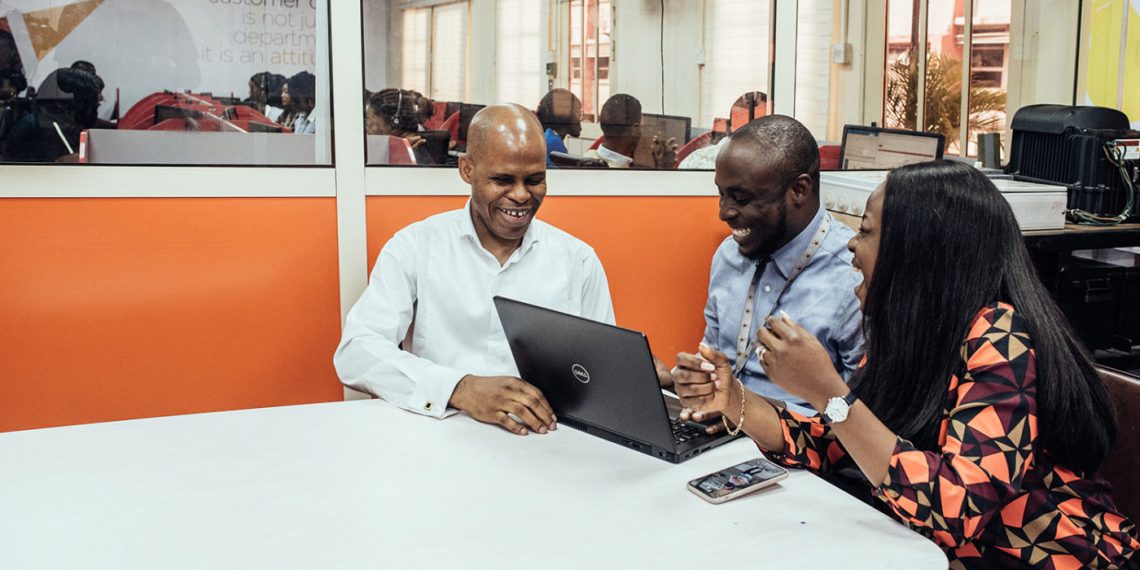Ahmed Abdulkareem Onimisi is a 32-year-old graduate of the Federal College of Education, Okenne. Though he is blind, he finished with a very fine grade in Agriculture Education. As a result of this performance, Onimisi was sure of a job, at least teaching.
Two years after graduation, he was unable to secure a job, all because he is physically challenged. The Kogi-born graduate’s dream of impacting knowledge on students seems dimmed consequent to the inability to sail through various job applications he made.
In November 2021, Onimisi applied to a private school, Leaders and Heirs International Academy, when he came across its vacancy advert on the radio. He sent a letter to the e-mail details provided on the radio. He was asked to submit an application letter after which an aptitude test was conducted online.
After three different tests, Onimisi was shortlisted for a physical interview and he was in regular communication with the coordinator of the interview panel, who seemed to be excited about Onimisi’s outstanding performance throughout the stages.
Onimisi, who never indicated his disability status during the application process, was startled with numerous questions when he arrived at the venue of the interview.
“The coordinator whom I have been speaking with on phone was shocked to see that I am blind. He was not sure of how to react and he was busy asking me, how were you able to press the phone to speak to me or how were you able to send emails and do the test online,” explained Onimisi.
Nevertheless, he was instructed along with other applicants to do a written interview, a task that was difficult for Onimisi because he would require a laptop or typewriter to do such. To resolve the issue, a staff member of the school dictated the questions to him and he dictated his answers to the staff, who helped to write them out.
“I was told that there were laptops available but they refused to provide one for me to do the test. After the test, I was told that I would receive feedback and I left. I followed up with the coordinator a couple of times, but he kept telling me he would get back to me and after a while, he stopped answering my calls,” Onimisi recounted.
While trying to just find a means of livelihood, after the third failed attempt to secure one, Onimisi ventured into bag-making business, a skill he had learnt in 2017 while in higher institution. He goes to exhibitions from time to time and displays the bags for sale.
During an event in May 2022, Onimisi displayed his wares as always and people visited his exhibition booth, where the coordinator of the interview panel for one of the jobs he applied for, came to apologise.
“He told me he was an external consultant to the school but the school owner insisted that she would not recruit a blind person into his workforce. The consultant confirmed to me that I had the qualification and level of expertise required for the role, but my disability was the only barrier,” Onimisi shared.
Challenges of PWDs in Accessing Employment
Persons with Disabilities (PWDs) encounter numerous challenges in accessing employment opportunities, broadly categorised into attitudinal, institutional, and environmental barriers. Specifically, PWDs are denied employment majorly because of the negative attitudes of employers to PWDs, where they are seen as not capable to be employed, as well as, the age limit required for some entry jobs, whereas a PWD has encountered multi-layered difficulty before graduating from school.
Other barriers to employment for PWDs include; accessibility barriers in built environments. This includes transport, products, and services; welfare systems that discourage people from entering employment; Insufficient disability support services, and a lack of inter-agency liaison; Non-inclusive education, and vocational training leading to lower levels of education, training and skills among persons with disabilities.
Also standing as barriers are; the lack of structured support for younger people with disabilities when making the transition from school to work; Lack of awareness and confidence on how to include persons with disabilities in the workplace; Inaccessible work premises and work tools, including Information and Communication Technologies (ICT); among others.
Most employers address disability issues with the Charity model where PWDs are seen as objects of pity and should not be employed. Reports also show that the government is the highest employer of PWDs in Nigeria, which means PWDs who would prefer to be in the private sector have little or no chance of that.
Meanwhile, International and National legal frameworks such as Article 27 of the United Nations Convention on the Rights of Persons with Disabilities (CRPD) and the Discrimination Against Persons with Disabilities (Prohibition) Act recognize the right of persons with disabilities to work, on an equal basis with others; this includes the opportunity to gain a living by work freely chosen or accepted in a labour market and work environment that is open, inclusive and accessible to persons with disabilities. The frameworks also prohibit all forms of employment discrimination, promote access to vocational training, promote opportunities for self-employment, and call for reasonable accommodation in the workplace, among other provisions.
The Burden of Unemployment for PWDs
The World Bank report shows that PWDs are more likely to experience extreme poverty in Nigeria than those without a disability. Although employment provides income opportunities but also opportunities for social participation which is especially important for PWDs.
Without a dignifying job, PWDs and their dependents would live in poverty and the cycle continues. Ahmed Abdulkareem Onimisi who had ventured into bag-making business shared how difficult it is to cope for a PWD like him.
“I would like to get a job, whether in the private or public sector. Although I am into business, it is not sufficient. PWDs, who are into business are usually into petty businesses, we are not even open to financial opportunities that can help us to grow our businesses as we would want,” he added.
Pius Nyong, who is blind and leg amputee, in an interview with BONews Service, shared how tough it has been for himself and his family to survive.
“We practically live on my wife’s meager salary. I lost my job when I had diabetes mellitus which led to my total blindness, my leg amputated, and kidney problems. Managing my health is a lot of money on its own, in addition to paying school fees, rent, utility bills and so on.
“Feeding has become extremely difficult in the house. We eat today without assurance of what we will eat the next day. It also doesn’t seem like it would end soon because who would give me a job because of my multiple disabilities,” Nyong recounted in tears.
Rather than take to the street to beg for alms, Nyong has been involved in petty businesses, with little or no success recorded, just to provide for his family.
Inclusion Works: A Timely Intervention
Sightsavers is an international non-governmental organisation that focuses on the prevention of avoidable blindness, and the promotion of equality for people with visual impairments and other disabilities, through its Inclusion Works project, which is seeking to address two key barriers of PWDs to employment.
The Inclusion Works project addresses the lack of disability confidence in employers and the lack of confidence and job readiness of job seekers with disabilities. To do this, the initiative worked with employers to improve their disability confidence, providing practical guidance, advice, and training to improve their knowledge and awareness about the steps they could take to be more inclusive.
Through the initiative, accessibility audits were conducted for private employers to make them aware of the wrong and good (unknown) practices, as well as to support the organisations to develop policies that could make the workplace disability-inclusive.
Series of training were also conducted for PWDs to build their confidence and familiarise with the work environment.
One such training is the Accenture Skills to Succeed (S2S) online learning platform for job seekers with disabilities in Nigeria. The platform offers more than one hundred free employability modules to support learners get their first job or start their businesses.
Also, the initiative adopted the mentoring/mentee model – where Human Resource professionals, serving as career advisers, are mentoring job seekers with disabilities.
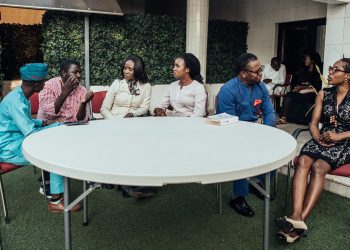
Rasak Adekoya, Programme Development Advisor, Economic Empowerment at Sightsavers, explained that the initiative had helped more than 200 PWDs transition into new employment in Nigeria since it started in 2020. Adekoya explained that within three months of commencing the project, 30 percent of job seekers with disabilities in Nigeria that were trained through the initiative were already placed in a job, adding important skills to their employers.
“A combination of mentoring for job seekers blended with soft skills training proved successful and more than 200 people with disabilities transitioned into employment. These include skills like interpersonal skills, pitching during interviews, personal branding, etiquette, communication, and networking among others,” Adekoya added.
Cyril Ojembe, a 49-year-old blind man, is one of the 200 beneficiaries of the initiative, which helped him to secure a teaching job. Ojembe was a teacher before he lost his sight in June 2016 and has been unable to secure another job until 2020.
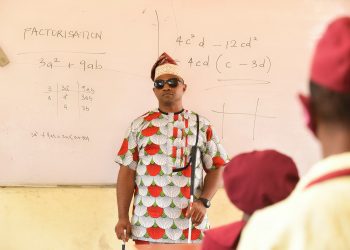
He participated in the S2S course and it equipped him with the relevant skills to be able to resume his teaching role as a Mathematics teacher in a private school. Ojembe explained that he did all he could to take the course, stressing that “the internet was my biggest challenge. The network in my community was bad. I would go as far as 5-kilometre from my house to find a stable network.
“I was doing this because I had thought I would not be selected considering my age. But when I got the opportunity, I never wanted to waste it. The learning from the S2S platform contributed to getting the teaching job I got.”
Another beneficiary is Akpevwe Peters, who is physically disabled and currently works at Unilever as a Consumer Engagement Specialist. Peters said, “The courses on the Accenture S2S platform were a game changer for me, particularly, the module on interviews really prepared and guided me when I was going for my interview at Unilever. I have gone for many interviews before but never knew my mistake until I studied this particular module on S2S”.
Sustaining the Initiative
Adekoya explained that to put in place a sustainable convening body that could champion disability inclusion among employers in Nigeria, Sightsavers approached the Chartered Institute of Personnel Management (CIPM) which is the Human Resource regulatory body in Nigeria.
Sightsavers conducted a Disability Accessibility Audit at the CIPM headquarters in Alausa, Lagos as well as training their staff on how to be disability conscious. The HR courses/modules by CIPM were also modified to ensure they are disability sensitive.
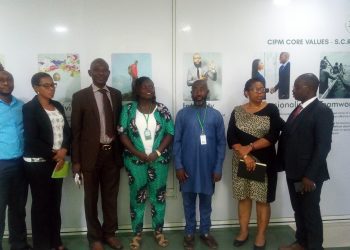
CIPM, after being trained, was able to engage its members on the need to have a disability-sensitive workforce.
Adekoya thereafter noted that working with CIPM led to the formation of the Nigeria Business Disability Network, an employer-led forum championing disability inclusion in the workplace and advocating for the same to the government.
He described the network as a huge success and a game changer in providing a supporting system and boosting employers’ disability confidence.
Corroborating him, the President of the CIPM, Mr. Olusegun Mojeed said, “The partnership between us and Sightsavers gave birth to the formation of the Nigeria Business Disability Network (NBDN).
“We acknowledge the impact of diversity and inclusion in the workplace and from our research in the past, disability inclusion in the workplace is very weak in Nigeria. This is an indication to us that there is a need for more effort to be intensified on this.”
Ms. Omobolanle Victor-Laniyan, Head of Sustainability at Access Bank asserted that “prior to being contacted by the CIPM, our company had significant interest and investment in diversity and inclusion, but disability is a gap we are yet to confidently fill, not because we don’t want to, but we just don’t have the expertise about the how.”
Victor-Laniyan emphasised that “Knowledge exchange is key for any network to thrive. In all our meetings, we ensure we discussed topical issues affecting the businesses in becoming a disability confidence organisation.
“With support from Sightsavers, many members including Access bank, have received direct technical assistance that are grounded in the reality of their businesses. Those who had benefited used their stories and learnings to influence others.”
Adekoya also explained that another effort to make the initiative sustainable was that “we worked with the Lagos state government to pilot an access-to-work mechanism, linking the state government to the UK Department of Work and Pensions to get some mentoring.
“This makes it easier for companies to be more inclusive of people with disabilities because they can access financial support for reasonable adjustments or accommodations within the workplace that they can’t afford.”
Disability Confident Employers
Through the Inclusion Works Project, the low employment rate among people with disabilities is being addressed by some of the private sectors that Sightsavers has engaged.
One of such is the Ikeja Electricity Distribution Company (IKEDC), a power supplier firm based in Lagos, Nigeria. Through the support from Sightsavers, they made adjustments to their practices.
Henry Ajibola, IKEDC’s Human Resource and Administration Officer said “for us, we do not look for the typical things that most employers look out for, which is more around what educational qualifications you bring on the table. We look at things like creativity, problem-solving, how analytical you are, and what value you create at work.”
She confirmed that the new approach has helped them bring two employees with disabilities on board who are excelling in their new roles. “They bring tenaciousness, resilience to their work, and dedication. Those are the things they bring on a daily basis that have made them stand out in the work that they do,” she added.
Some of the other organisations that have been engaged by Sightsavers and are now disability-confident employers include Accenture, Access Bank, Ab InBev, Chartered Institute of Personnel Management, Coca-Cola Beverages in Africa, Diageo (Guinness), Kano Electric Distribution Company, MTN, Standard Chartered Bank and Unilever.
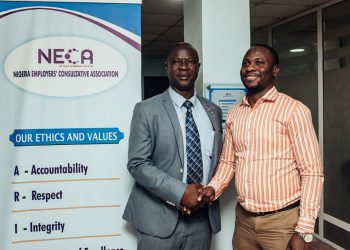
What happens after Inclusion Works
Inclusion Works is a project-based initiative that was implemented between July 2019 – June 2022 though it has been extended because of the impact recorded so far, the initiative would not be extended indefinitely.
The project was implemented in FCT-Abuja, Lagos, and Kano States only and there is the possibility that job seekers with disabilities in other states, especially rural communities are unable to benefit from the training which is being delivered online. For instance, Cyril Ojembe explained how he had to travel 5-kilometre per trip, to be able to access the internet to enable him to participate in the S2S training.
Significantly, there are organisations that are not members of CIPM or NBDN, that are not disability-conscious, and it is difficult for them to employ PWDs in their workforce. Such organisations could be small but they are in different parts of the country and are better positioned to employ PWDs who are spread across the country.
Sharing one of the major challenges of the programme, Adekoya said “it ran during a period of the huge health and economic shock during Covid-19 when labour markets were massively disrupted. Yet through the programme, we have demonstrated how people with disabilities can get into formal employment or can get jobs, even in periods where companies are not actively recruiting at the same pace they were before.
“For example, at the end of 2021, we ran a refreshed labour market assessment in Nigeria where we noticed that youth unemployment had massively increased in the period since Inclusion Works began – by 43%. And yet we were still getting significant numbers of people into jobs.”
This story has been made possible by Nigeria Health Watch with support from the Solutions Journalism Network, a nonprofit organization dedicated to rigorous and compelling reporting about responses to social problems.

